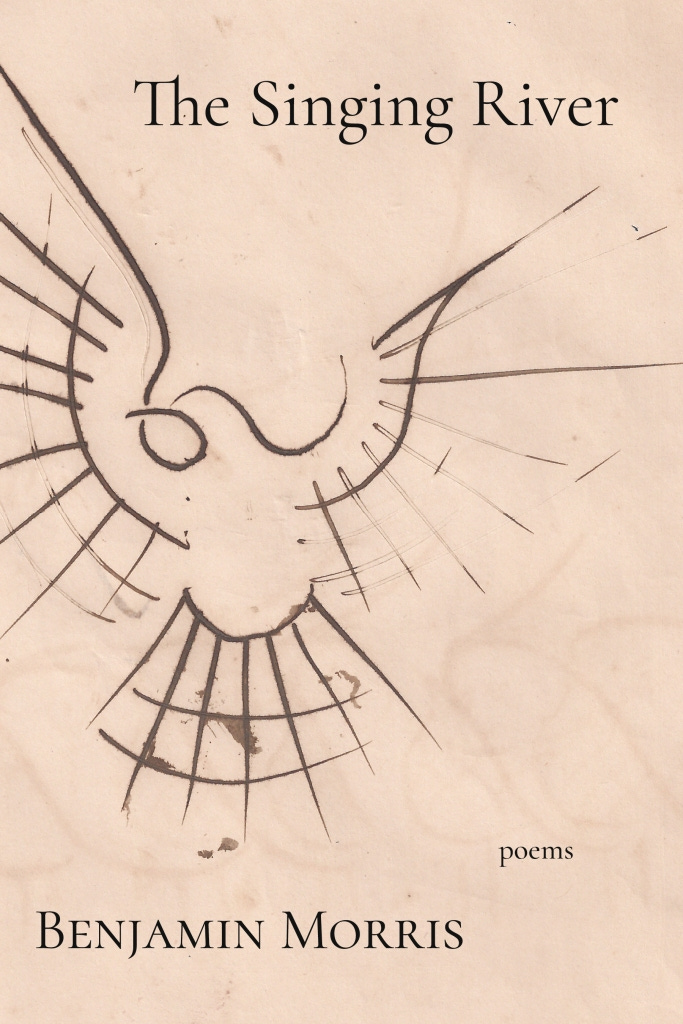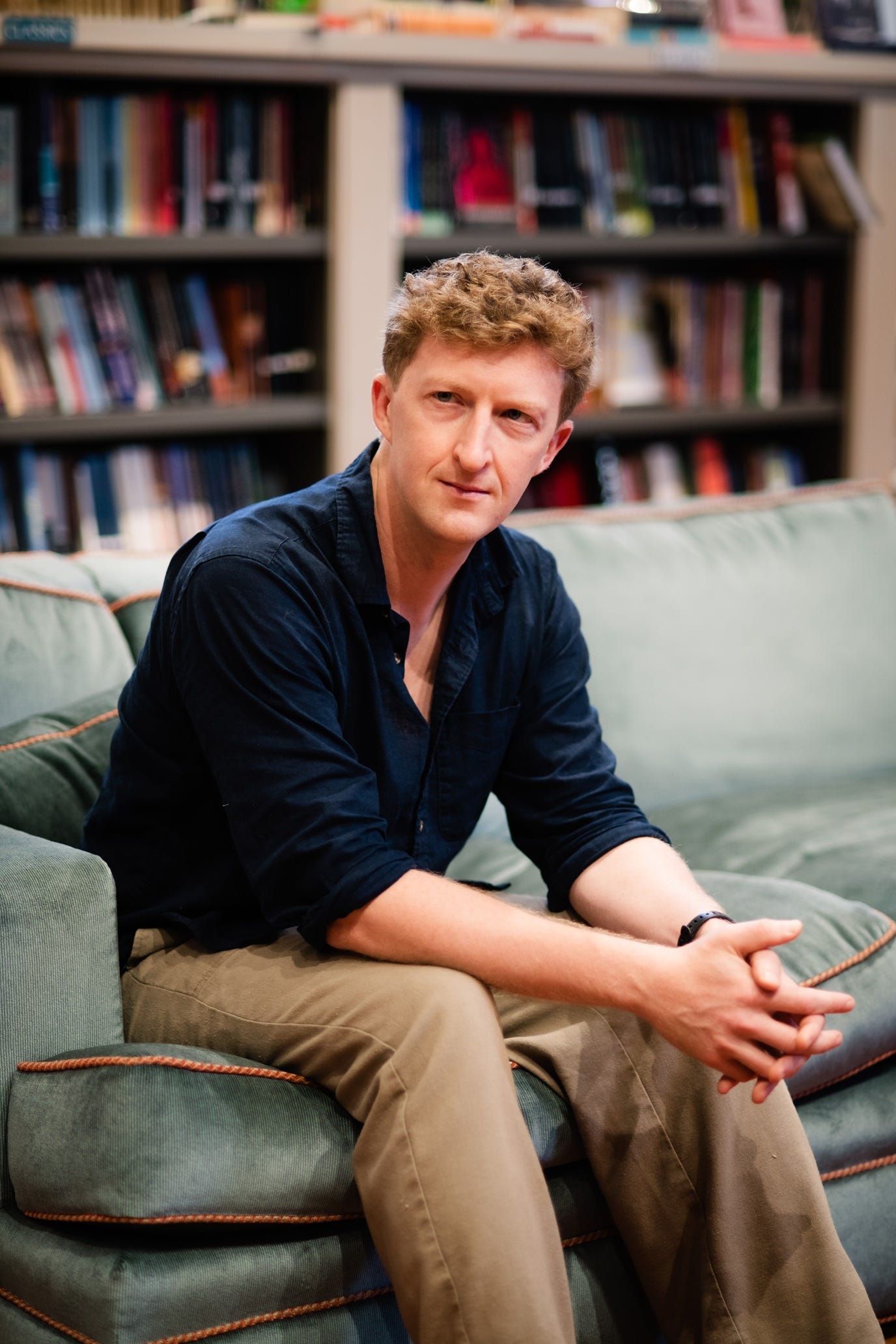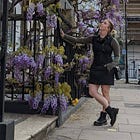Mississippi Expat: Benjamin Morris
"Growing up here, I observed time and again that what happens to one of us often happens to all of us—which is why it’s all the more important to give back beyond what we’ve been given."
What does it mean to call Mississippi home? Why do people choose to leave or live in this weird, wonderful, and sometimes infuriating place? Writer Benjamin Morris kids (kind of) that he doesn’t “live either in Louisiana or in Mississippi, but rather on I-55 or I-59 between them.” Originally from Hattiesburg, Benjamin is now based in New Orleans, where he’s found a home in the literary community there. Still, images of the Piney Woods still thread through his writing, including in his debut collection of poetry, The Singing River. “[M]any of the poems in The Singing River are directly inspired by the landscape of the Gulf Coast and surrounding region—this book is very southern, very Mississippi, even with its larger concerns.” Today, Benjamin shares the ways in which he stays connected—physically and spiritually—to his home state.
Where are you from?
I was born and raised in Hattiesburg, the Hub City.
When did you move to New Orleans and why did you move there?
Like many folks along the Gulf Coast, I’d been visiting New Orleans all my life—but it wasn’t until after Katrina hit in 2005 that I began spending more time there. While in graduate school overseas I studied the rebuilding process from the storm, living there for months at a time doing research, then moved to the city full-time in 2010.
What does “home” mean to you? How does Mississippi fit into that definition?
Growing up in the Piney Woods, it’s hard not to say rolling hills and pine forests. Though I live in a water-based landscape now, it’s hard not to miss that lush carpet of green and the intoxicating smell of pine sap. That, and what it means to sit and “visit” with someone: the particular genre of encounter by which it seems all of Mississippi functions. Other states and cultures have their version, but to my mind nothing will ever compare to a good visit. If you know, you know.
Though I live in a water-based landscape now, it’s hard not to miss that lush carpet of green and the intoxicating smell of pine sap. That, and what it means to sit and “visit” with someone: the particular genre of encounter by which it seems all of Mississippi functions.
What do you miss most about Mississippi?
The quick wit that comes so naturally to local folks. Years ago I’d just been paid for a job, and I’ll never forget an older friend of mine from Forrest County warning me to “check with the bank before trying to cash one of them Perry County checks”—such a sly but knowing sense of humor. He couldn’t resist the jab, but he delivered it with such a twinkle in his eye that you knew all was well.
How have you cultivated community in New Orleans? Do you still feel rooted to Mississippi?
Among other efforts, for the last nine years I’ve been privileged to serve as a coordinator for the New Orleans Poetry Festival. I’ve just stepped down following this year’s festival (our tenth anniversary) and will miss it terribly, but continue to organize in other ways. I maintain an open-access list of ongoing book-related events in the area, which anyone can make use of: https://benjaminalanmorris.com/neworleanslit/.
As for Mississippi, absolutely: in 2014 I published a history of the city of Hattiesburg, which I spent several years researching and writing, and which has gone on to live different lives. I’m also at work on a long-term project mapping the state highways in sonnets—one sonnet for each numbered highway—which I expect to finish in about twenty years. And of course, many of the poems in The Singing River are directly inspired by the landscape of the Gulf Coast and surrounding region—this book is very southern, very Mississippi, even with its larger concerns.

What’s the weirdest question or assumption you’ve encountered about Mississippi (or about you as a Mississippian) by someone who’s never been there?
When I still lived overseas, every now and then people would ask me in all seriousness whether we actually wore shoes. They’d never met someone from this area before. Honestly, I always hated to disappoint them.
How has being from Mississippi affected your identity and your life’s path?
One of the things I’m grateful for is that Mississippi gave me a foundation for place, a baseline against which I could test and compare anywhere else I went. It wasn’t perfect by any means, but it gave me a standard for how to treat folks, how to understand history (especially its darker and more complex sides), and how to see and make the best out of a challenging inheritance. Perhaps most significantly, growing up here helped me understand how not just to exist within a fabric of community, but how to contribute to it: how to try to make a difference, for justice, for beauty, for generosity. Growing up here, I observed time and again that what happens to one of us often happens to all of us—which is why it’s all the more important to give back beyond what we’ve been given.
Perhaps most significantly, growing up here helped me understand how not just to exist within a fabric of community, but how to contribute to it: how to try to make a difference, for justice, for beauty, for generosity.
What is something that you’ve come to understand about Mississippi by living elsewhere?
There’s an apocryphal story wherein Eudora Welty was once asked why there so many writers from Mississippi—“because we have a lot to explain,” she replied, and I think that’s true. Mississippi is a state of many paradoxes, and while not every state has gone through the same moral and political struggles we have, I understand now with distance that those paradoxes are deep-seated and generational, more than we like to admit. I’ll be specific: every time I hear a white person over sixty describe a Black man or woman as ‘articulate,’ I hear those paradoxes screaming.
Or that might just be me screaming. It could go either way.
Have you ever thought about moving back? What would need to happen in order for you to move back to Mississippi?
I’m back often enough for book events and for school (I’m taking classes part-time at the seminary in Jackson) that I don’t feel as though I’ve fully left. I often kid that I don’t live either in Louisiana or in Mississippi, but rather on I-55 or I-59 between them. It is… not untrue.
Mississippi is a state of many paradoxes, and while not every state has gone through the same moral and political struggles we have, I understand now with distance that those paradoxes are deep-seated and generational, more than we like to admit.
What do you wish the rest of the country understood about Mississippi?
Easy: our truly world-class creativity, not just in the book and music world but in other areas of the arts as well—Jim Henson, Walter Anderson, George Ohr, Dusti Bongé, James Earl Jones, Oprah Winfrey, Maude Schuyler Clay, the list goes on and on. We’ve produced some of the most talented artists on the planet, and yet everyone thinks we’re still a backwater. If only they knew!
Do you have a favorite Mississippi writer, artist, or musician who you think everyone needs to know about?
I have two: our former poet laureate Catherine Pierce, whose poems have been a real discovery. Smart, tense, full of surprises, and always searching for what lies beyond the immediate field of view. In music, I love the expat Caroline Herring’s albums—she has this perfect blend of soulful and innovative, diving deep into Southern identity and lore without ever romanticizing or sugar-coating.

If you had one billion dollars to invest in Mississippi, how would you spend your money?
That’s easy: I’d spend every last dime on our schools. On our teachers, to reward those who give their whole lives to serving others, and to make the profession more attractive to those who are considering it. On our facilities, to ensure that our students have the best environments possible in which to learn (my research on early education in Hattiesburg showed me how bad the contrasts here can be). And on our students themselves, to feed them, to provide them materials and experiences they need to flourish, and to show them that we truly believe that they are the future of the state.
What or who do you want to shamelessly promote? (It can absolutely be a project you’re working on, or something you are involved in.)
Our mutual friend C.T. Salazar is currently working on a series of much-needed histories of forgotten and lesser-known Mississippi poets, who can sometimes end up playing second-fiddle to our novelists and prose writers (not complaining, just observing). C.T. has spent years digging in the archives to try to reclaim these figures from oblivion, and I’ve been so impressed at everything he’s learned, retrieved, and brought to the public eye. Long may his efforts bear fruit!
A native of Mississippi, Benjamin Morris is a poet, writer, and researcher whose work regularly appears in the United States and Europe.
He is the author of Coronary (Fitzgerald Letterpress, 2011), Hattiesburg, Mississippi: A History of the Hub City (History Press, 2014), and Ecotone (Antenna/Press Street Press, 2017). His writing appears in The Oxford American, The Southern Review, The Los Angeles Review of Books, Lithub, The Guardian, and The Scottish Review of Books. His first full-length collection of poetry, The Singing River, was published by Belle Point Press in February 2025.
He holds an MSc in Creative Writing from the University of Edinburgh, and among other honors has received a Pushcart nomination, the Academy of American Poets Prize from Duke University, and the Chancellor’s Medal for Poetry from the University of Cambridge, where he earned his Ph.D. His work has received two poetry fellowships from the Mississippi Arts Commission, academic and creative fellowships from Tulane University, and a residency from A Studio in the Woods, as well as first place in the 2021 Words & Music Writing Competition for Poetry, judged by Aimee Nezhukumatathil. He lives in New Orleans.
One year ago:
Two years ago:









Another great interview. Glad to be introduced to another gifted MS writer!
Doc Ben is a great poet, cultural worker, and person.